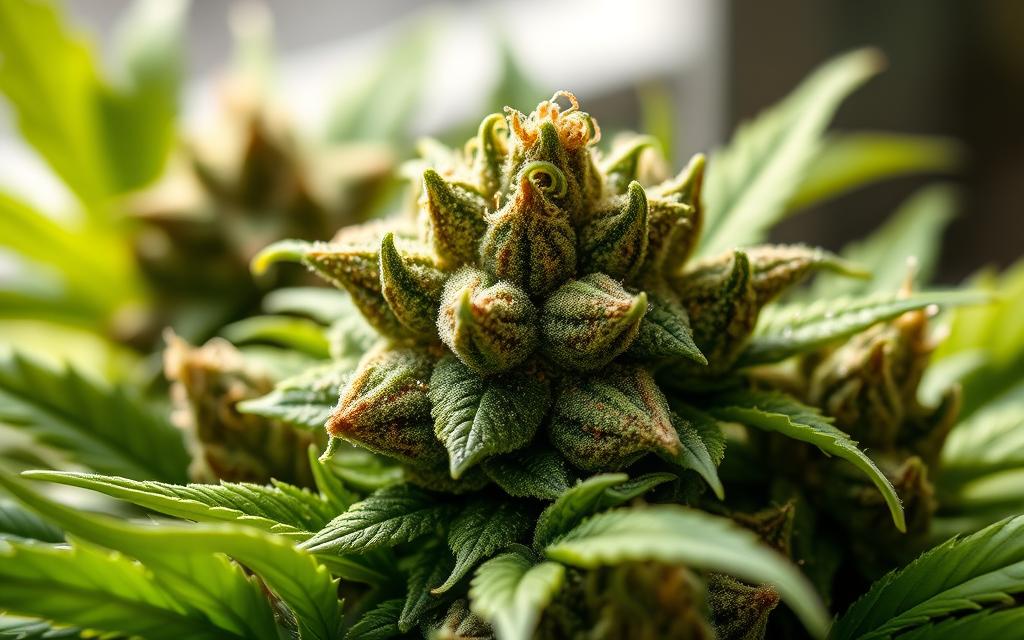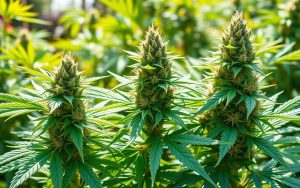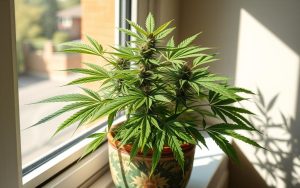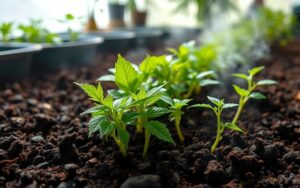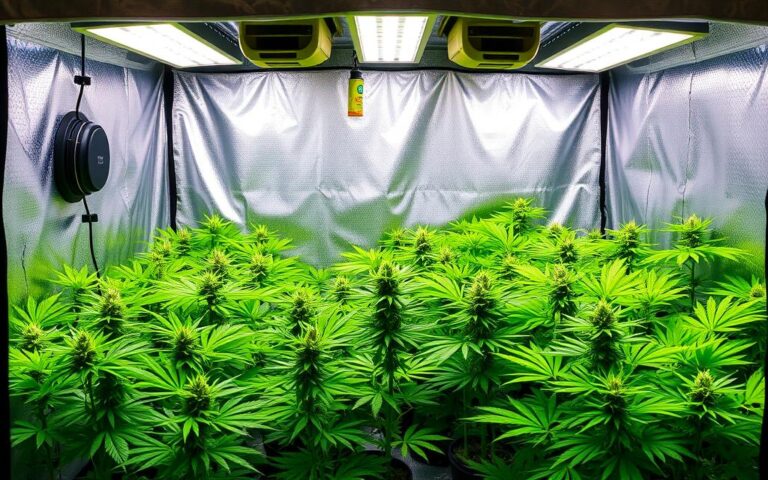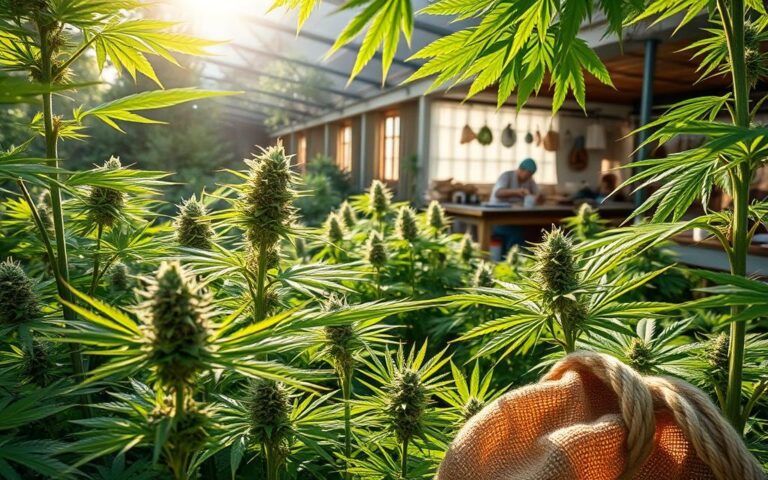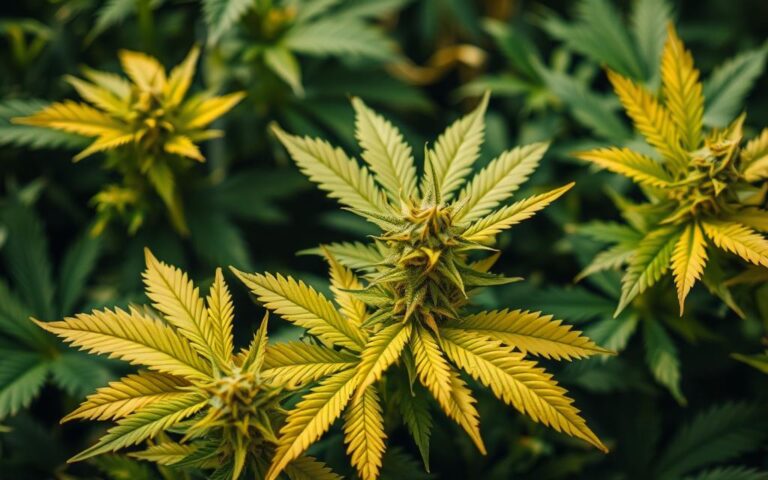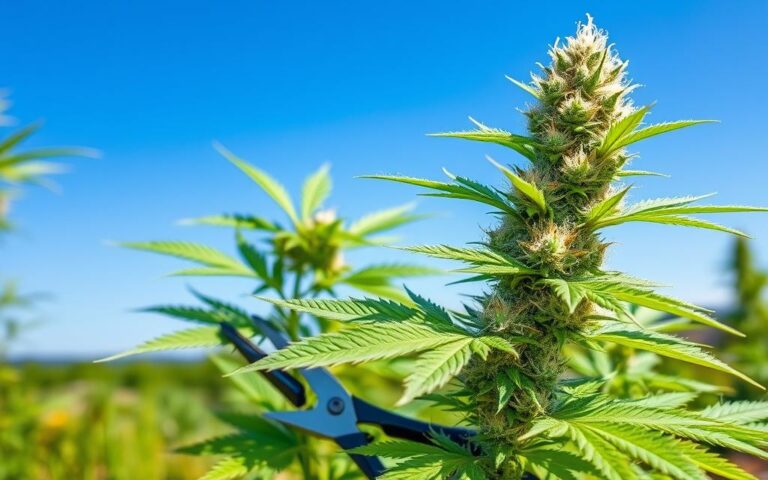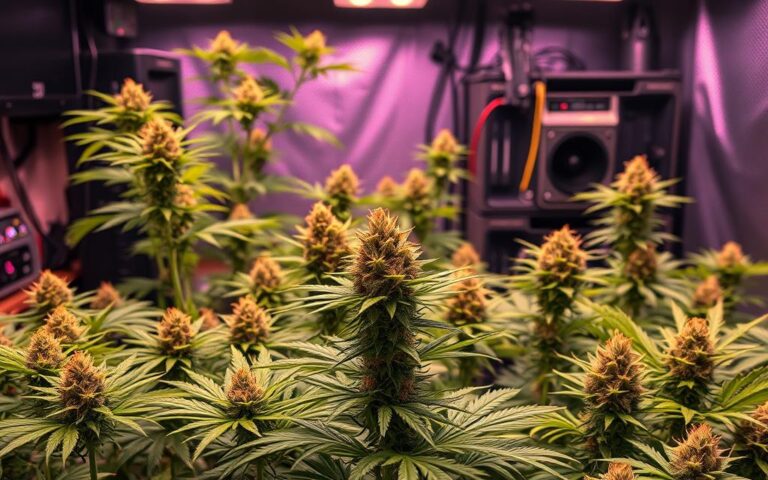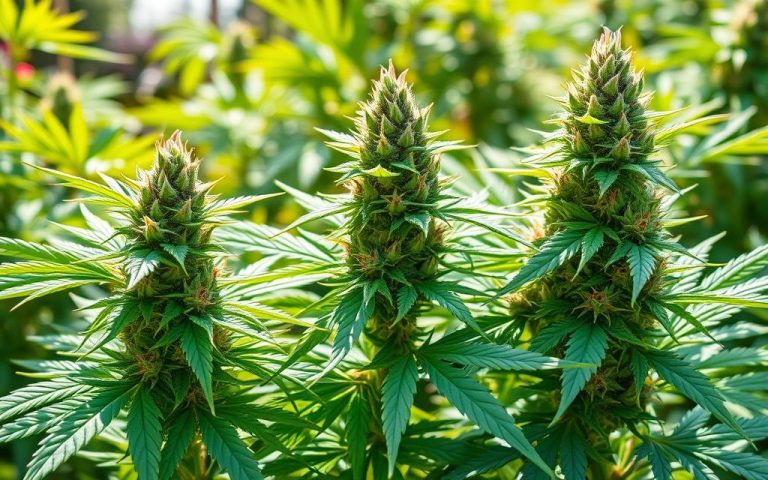How to Grow Better Cannabis Buds
Growing top-quality cannabis buds is both science and art. To achieve this, you need the right blend of genetics, environment, nutrients, and light. These elements are key to boosting your yield and getting dense, strong, and high-quality flowers.
Starting with excellent genetics is crucial. The strain you select drastically affects the buds’ quality. Also, monitoring temperature and humidity is important. Proper climate control, especially keeping seedlings at 18-24°C with 60-70% humidity, encourages healthy growth.
Learning about grow lights is essential. Regular bulbs won’t do; full-spectrum lighting ensures your plants bloom well. For more on growing great cannabis, check out tips on growing top-shelf buds. Following these steps will lead you to grow exceptional cannabis.
Start with Quality Seeds for a Better Bud
To cultivate exceptional cannabis, begin by selecting high-quality cannabis seeds. The genetics of the seeds are crucial for the quality of your buds. Quality seeds lead to strong plants and powerful yields. It’s also key to choose the right strains. Buying from reputable seed banks sets you up for a successful grow.
Understanding Genetics
Choosing the right strain means understanding cannabis genetics. Regular seeds may grow into male or female plants. Feminized seeds only produce female plants, which is beneficial for avoiding unwanted males. Auto-flowering seeds flower automatically, making them great for beginners. These seeds come from Cannabis Ruderalis and are easy to grow.
Where to Source High-Quality Seeds
Look for reputable cannabis seed banks when sourcing seeds. Online shops have a wide variety of strains to meet your needs. Avoid local bag seeds as they often lack quality. Checking seed quality is important and can include looking at:
- Colour: Quality seeds are usually dark brown with light stripes.
- Physical appearance: Look for seeds that are big, round, and plump.
- Texture: High-quality seeds have a firm shell.
- Float test: Seeds that sink in water are usually good.
Building a relationship with trustworthy sources like KindPeoples in Santa Cruz is wise. They can help you choose the best seeds for your garden. Having the right knowledge and resources is crucial for your growing success.
| Seed Type | Characteristics | Benefits |
|---|---|---|
| Regular | Can produce male or female plants | Variety in breeding |
| Feminized | Genetically engineered to yield only females | Maximises harvest potential |
| Auto-flowering | Flowers automatically after a certain maturity level | Short growth cycle, easy for beginners |
Optimise Your Growing Environment
Creating the best environment for growing cannabis hugely affects your plants’ health and yield. Temperature and humidity management is key for ideal growth conditions.
Temperature and Humidity Management
It’s vital to keep the temperature control and humidity control right, especially during different growth stages. Begin with a temperature of 18-24°C and 60-70% humidity during the seedling stage. This sets a strong base.
When plants move to the vegetative stage, lower the humidity by 5% every week. In the flowering stage, aim for 20-25°C and 40-50% humidity to reduce mould risk and increase resin output. Use Vapor Pressure Deficit (VPD) charts to adjust conditions correctly.
Importance of Proper Airflow
Proper temperature and humidity are important, but so is cannabis airflow for a healthy garden. Good airflow cuts down mould risks and encourages strong growth. Making space between plants improves air flow and light reach, key for strong plants.
Techniques like low-stress training create wider plants. This maximises light and air benefits, leading to tougher, better buds and a higher quality harvest.
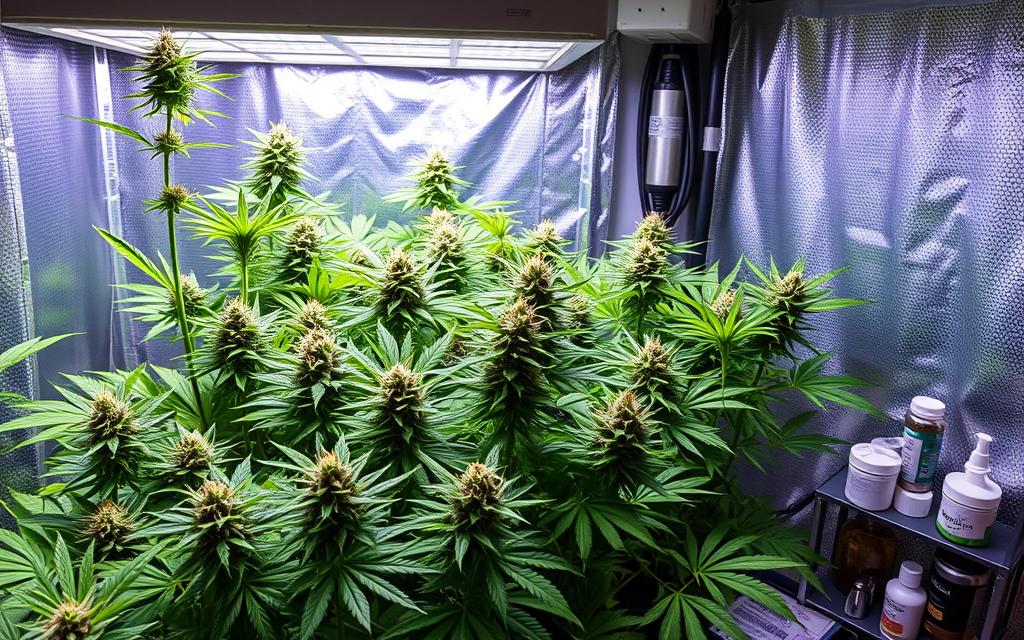
Lighting Essentials for Lusher Cannabis
Getting the lighting right is key to growing vibrant cannabis plants with lots of buds. The choice of grow lights directly affects the plant’s growth and quality. You can pick between HID lights and LED lights for your cannabis. Knowing how they differ can guide you to the best choice for your setup.
Selecting the Right Grow Lights
High-intensity discharge (HID) lights are a top choice for many growers. They deliver strong light that reaches deep into the plant, fueling growth. In contrast, LED lights offer a wide range of light while using less power, saving money. The best grow lights depend on the plant’s stage, your space, and your budget.
Light Schedules for Maximum Yield
A smart light schedule boosts cannabis yields. During the growing phase, 18 hours of light and 6 hours of dark encourages growth. Switching to 12 hours of light and 12 hours of dark during flowering aids bud formation. Adjusting light based on the stage helps grow healthier, bulkier buds.
Nurturing Nutrients for a Better Bud
Nutritional balance is key for healthy cannabis plants. Knowing what nutrients to use at each growth stage is important. It affects plant health and how much yield you get.
Essential Nutrients and Their Role in Growth
Cannabis needs main nutrients like nitrogen (N), phosphorus (P), and potassium (K). These are shown as N-P-K on fertiliser packs. They help with leaf growth, roots, and overall health. In the growth stage, more nitrogen helps with chlorophyll and keeps plants growing well.
When plants start flowering, they need different nutrients. Phosphorus helps roots and energy movement. Potassium makes the buds thick and sticky. Don’t forget about calcium, magnesium, and sulfur – they keep the plant strong and healthy.
Even though only needed in small amounts, iron, copper, zinc, and boron are vital. They make the plant’s processes better and improve health.
Adjusting Nutrients During Growth Stages
Changing what nutrients you give cannabis is crucial. Keep an eye on macronutrient levels for the best growth. When it’s time for the flowers to grow, use less nitrogen but more phosphorus and potassium. This makes the buds bigger and tastier.
There are organic and synthetic fertilisers. Organics are good for the soil and make flavours better. Synthetics work fast and are great for hydroponics, fixing plant problems quickly.
| Growth Stage | Nutrient Ratio | Main Nutrient Focus | Actions |
|---|---|---|---|
| Seedling | 2:1:2 | Nitrogen | Low-strength nutrients, regular monitoring |
| Vegetative | 4:2:3 | Nitrogen | Increase SSH and monitor growth |
| Flowering | 5:7:10 | Phosphorus, Potassium | Adjust nutrient ratio to support bud development |
Use methods like chelation and spraying nutrients directly on leaves to improve how plants take in food. Flush plants with neutral pH water before harvesting. This gets rid of leftover nutrients, ensuring top quality cannabis. Understanding how to adjust nutrients helps growers increase their yield and create better tastes in their buds.
Conclusion
Getting better at growing cannabis begins with learning important growing tips. Focus on selecting good genes and maintaining a controlled environment. Make sure you have the right amount of light and nutrients. This way, you’ll get plants that are not only healthy but also give you tasty and potent buds.
It’s also vital to keep up with the latest news in the cannabis world. One way to do this is by reading reliable blogs. These can inform you about new trends and updates in cannabis growing. The cannabis world is always changing, so staying informed helps you improve your growing practices. To help with this, check out top cannabis blogs that offer educational content and news on the industry.
To sum up, use these tips and always be keen to learn more. Treat growing cannabis as a journey where there’s always something new to learn. Enjoy your gardening, knowing you have the knowledge to grow excellent cannabis. Your effort and dedication will surely pay off in the quality of your buds.
FAQ
What are the key factors that influence cannabis bud quality?
The quality of cannabis buds relies on genetics, environment, light, nutrients, and when you harvest. Getting these right helps growers produce dense, sticky buds with high potency.
How can I ensure I am selecting high-quality cannabis seeds?
To pick high-quality cannabis seeds, buy from well-known breeders and seed banks. They offer a wide range of strains. Avoid seeds from local sources as they may not have strong genetics.
What is the ideal temperature and humidity for cannabis growth?
In the seedling stage, aim for 18-24°C and 60-70% humidity. For vegetative growth, reduce humidity slowly. During flowering, keep the temperature at 20-25°C and humidity at 40-50%.
How important is airflow for cannabis plants?
Good airflow is key to strong cannabis plants. It helps avoid mould and improves light reach. This makes the plants healthier and more robust.
What types of lighting are best for growing cannabis?
HID and full-spectrum LED lights are best for high cannabis yield. Incandescent bulbs won’t work well because they don’t give enough light for plant growth.
How should I structure my lighting schedule for optimal growth?
For vegetative growth, use an 18/6 light cycle. This means 18 hours of light and 6 hours of dark. Switch to a 12/12 cycle during flowering to get the best bud growth.
What role do nutrients play in cannabis cultivation?
Nutrients are vital for healthy cannabis plants. Use high nitrogen in the vegetative stage for leaf growth. Phosphorus and potassium help in the flowering stage, improving bud size and quality.
How do I adjust nutrients during different growth stages of cannabis?
Adjust your nutrient mix based on the growth stage. Lower nitrogen when flowering starts. Increase phosphorus and potassium to boost bud growth and quality.

